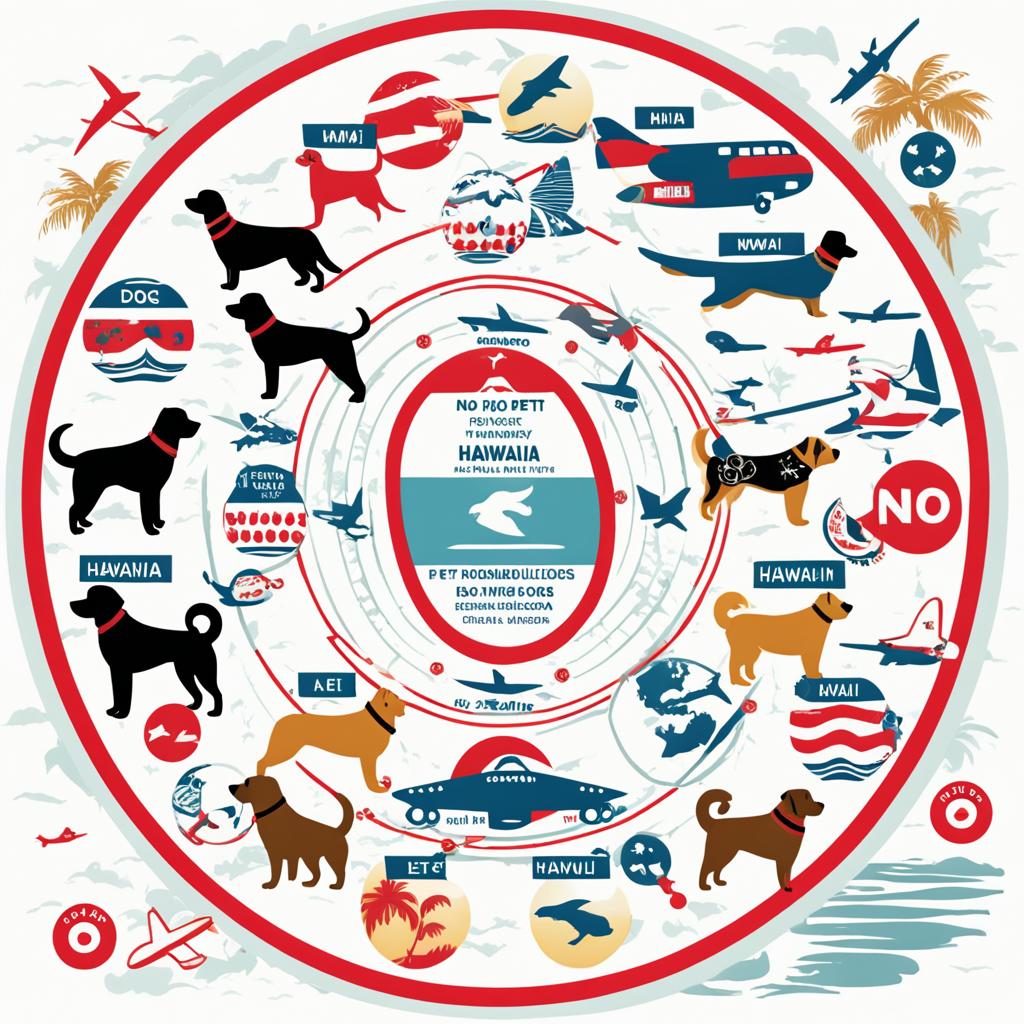Are you considering bringing your dog to Hawaii? Before you make any plans, it’s crucial to understand the regulations surrounding dog breeds that are not allowed in the state. Hawaii has specific restrictions in place to ensure public safety and prevent incidents involving aggressive dogs. Failing to comply with these regulations can lead to penalties, fines, and even the seizure of your beloved pet.
So, which dog breeds are not allowed in Hawaii? Let’s explore the list of restricted breeds and uncover the reasons behind these regulations. Whether you’re a resident or a visitor, it’s essential to be well-informed to avoid any unnecessary complications for you and your furry friend.
To help you navigate the intricacies of dog ownership in Hawaii, we’ll also discuss the requirements for importing dogs into the state and outline the pet policies of airlines for Hawaii travel. Additionally, we’ll explore alternative options for dog owners whose breeds are not allowed or who are unable to meet the import requirements.
Stay tuned to find out everything you need to know about bringing your dog to Hawaii, the restrictions in place, and alternative solutions available to ensure you and your furry companion have a memorable and safe experience in the Aloha State.
Hawaii’s Breed Restrictions

Hawaii imposes strict breed restrictions to ensure public safety and reduce the risk of incidents involving aggressive dogs. The state has identified a list of dog breeds that are not allowed in Hawaii. If you are a dog owner planning to move or vacation in Hawaii, it is important to familiarize yourself with these breed restrictions to avoid any legal complications and ensure the well-being of your furry companion.
The prohibited dog breeds in Hawaii include:
- Pit Bull Terriers
- American Staffordshire Terriers
- Presa Canario
- Dogo Argentino
- Cane Corso
- Fila Brasileiro
- Tosa
- Mixtures of the aforementioned breeds
Enforcing these breed restrictions helps to ensure the safety of residents, tourists, and other animals in Hawaii. It is essential to comply with these regulations as failure to do so may lead to penalties and even the seizure of your dog. Hawaii’s breed restrictions aim to prevent incidents that may be caused by inherently aggressive dog breeds, promoting a safer environment for all.
| Breed | Reason |
|---|---|
| Pit Bull Terriers | Known for their history in dogfighting, these breeds can exhibit aggressive behaviors. |
| American Staffordshire Terriers | Similar to Pit Bull Terriers, these breeds have a history of aggression. |
| Presa Canario | Originally bred for working livestock, they can be territorial and aggressive. |
| Dogo Argentino | Bred for big-game hunting, this breed has a high prey drive and can be aggressive towards other animals. |
| Cane Corso | A guardian breed with a protective nature, they can exhibit aggression towards unfamiliar people or animals. |
| Fila Brasileiro | A breed with a strong prey drive and protective instincts, they can be aggressive and potentially dangerous. |
| Tosa | Bred for dogfighting, this breed is known for its aggression and strength. |
| Mixtures of the aforementioned breeds | Any mixtures or hybrids of these breeds are also not allowed in Hawaii. |
Importing Dogs to Hawaii

If you are planning to bring your dog to Hawaii from another state or country, you will need to follow certain requirements. These include:
- Microchipping your dog: It is essential to ensure that your dog is microchipped with a valid identification number. This helps in the identification and tracking of your pet.
- Vaccinating for rabies: Your dog must receive the rabies vaccination, and it should be done at least 30 days before entering Hawaii.
- Obtaining a rabies titer test: Some countries require a rabies titer test to measure the level of rabies antibodies in your dog’s blood. This test determines if your dog has enough protection against rabies.
- Treating for ticks: Hawaii is vigilant about preventing the introduction of ticks into the state. Therefore, it is necessary to treat your dog for ticks before traveling to Hawaii.
- Completing a pet health certificate: You must obtain a pet health certificate issued by an accredited veterinarian within 14 days of your dog’s arrival in Hawaii. This certificate confirms that your dog is healthy and free of contagious diseases.
It is important to note that failure to meet these requirements can result in quarantine or other measures upon your dog’s arrival in Hawaii. To ensure a smooth import process and to avoid any issues, make sure to thoroughly research and comply with all the necessary regulations.
Airlines’ Pet Policies for Hawaii Travel

When planning to travel to Hawaii with your dog, it is essential to be aware of the pet policies of the airlines you intend to use. Each airline has its own set of rules and restrictions regarding pet travel, including specific guidelines for traveling to Hawaii. Understanding these policies will help ensure a smooth and hassle-free journey for you and your furry friend.
Before making any travel arrangements, it is recommended to contact the airline directly. By doing so, you can acquire accurate and up-to-date information about their pet policies. This will help you make all the necessary arrangements for your dog’s travel and avoid any last-minute surprises.
One aspect to consider is the breed restrictions imposed by airlines. While some airlines have specific breed restrictions for all their flights, others may have additional restrictions when traveling to Hawaii due to the state’s regulations. It is crucial to confirm whether your dog’s breed is permitted on the airline you choose.
Temperature regulations are another important factor to consider. Hawaii’s warm climate necessitates careful attention to the well-being of your dog during travel. Some airlines have restrictions on transporting pets during extreme temperatures to prioritize their safety and comfort. Ensure you understand the airline’s temperature-related policies and make appropriate arrangements.
By understanding the airlines’ pet policies and adhering to them, you can ensure a stress-free and enjoyable journey with your beloved pet to Hawaii.
Alternatives for Dog Owners
If your dog belongs to a breed that is not allowed in Hawaii or you are unable to meet the import requirements, there are alternatives for dog owners. It is important to prioritize the well-being and safety of your dog and adhere to the regulations in place.
One option is to find a temporary caregiver for your dog, such as a trusted friend or family member. This allows your dog to be in a familiar and comfortable environment while you are away. Make sure to provide clear instructions and any necessary supplies to the caregiver to ensure your dog’s needs are met.
Another alternative is to consider alternative vacation destinations where your dog is welcome. Research pet-friendly hotels, parks, and attractions in other states or countries that have less stringent restrictions. This way, you can still enjoy a vacation with your furry companion without compromising their well-being or breaking any laws.
Remember, responsible pet ownership means understanding and abiding by the regulations in place. While it may be disappointing that your dog cannot accompany you to Hawaii, exploring these alternatives ensures that your four-legged friend is safe, happy, and well-cared for.


